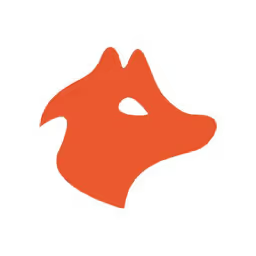Vonage Alternatives
A direct comparison of 10 Vonage alternatives. We review features, pricing, and support to help you select a new business phone service.
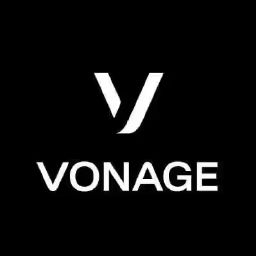
Many businesses choose Vonage for good reasons. It performs well as a straightforward communication tool, with users often praising its ease of use and reliability for VoIP services. It gets the job done for many specific communication needs.
But no tool is perfect. Some users report occasional call connectivity issues or find customer service could be better. That's why we analyzed top alternatives, comparing them to Vonage based on G2 reviews to help you choose. Let's get started.
Consider 11x For Your Sales Team
If your sales team is interested in digital workers, 11x provides tools for automating communication tasks. Consider exploring its features if you want to add this capability to your sales process.
11x is a GTM platform with AI agents that automate the sales process. An agent named Alice finds prospects, handles outreach on email and LinkedIn, and updates the CRM. Julian, another agent, qualifies inbound leads and books meetings.
The platform unifies functions like data enrichment, outreach, and email warmup. This removes the need for multiple, separate point solutions for your GTM stack.
Vonage Alternatives
Below is a detailed breakdown of top Vonage alternatives. We will compare each service on pricing, main features, and specific pros and cons relative to Vonage.
1) RingCentral MVP
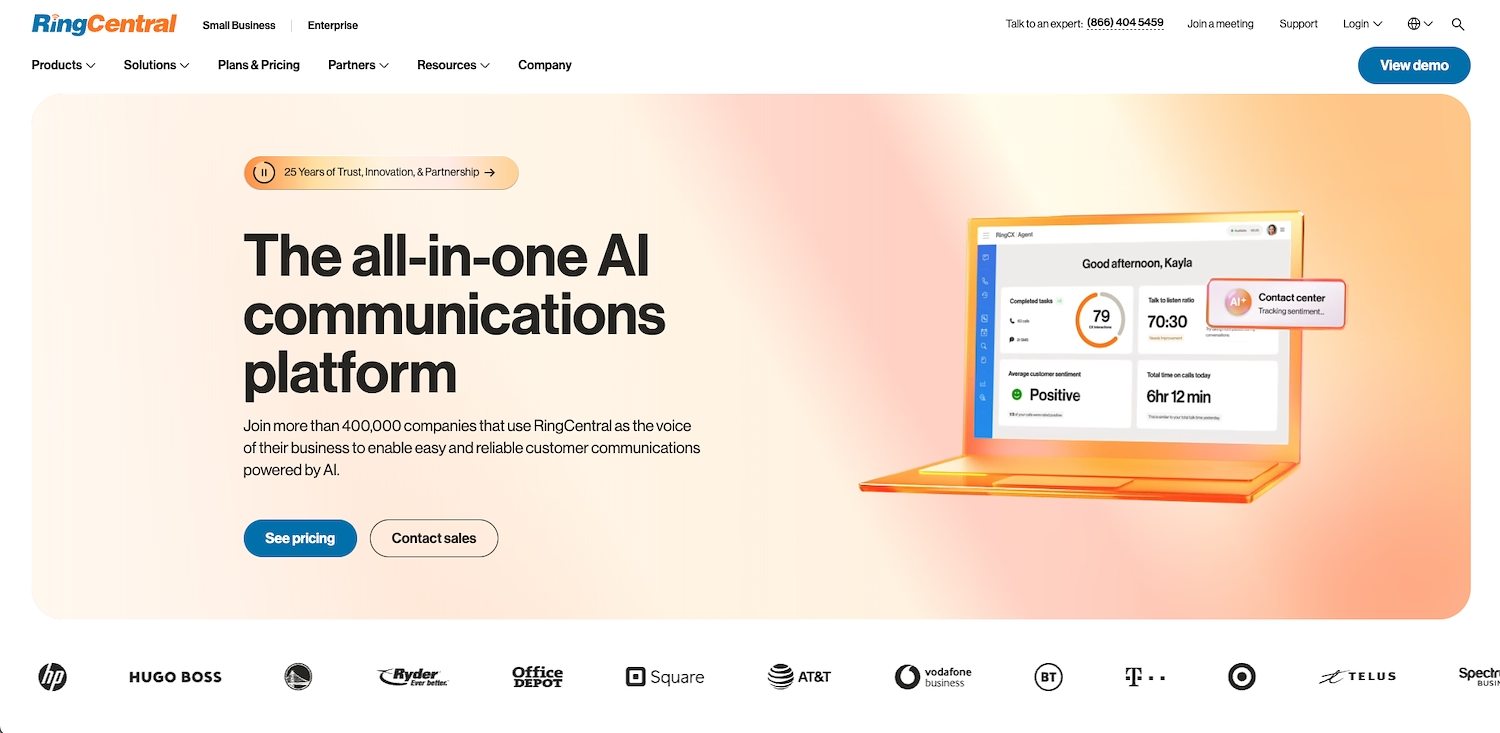
RingCentral MVP is a unified communications platform that functions as a direct alternative to Vonage. Its services cover business communication needs, including phone dialer functions.
The platform combines multiple communication channels into one application. This makes it a choice for companies that want to consolidate their tools and evaluate different VoIP providers.
RingCentral MVP's Main Features
- Integrates voice, video, and messaging into a single application.
- Provides business phone services with features for call management.
- Offers team messaging with file sharing and task management capabilities.
- Includes video conferencing for online meetings with screen sharing.
How RingCentral MVP Compares To Vonage
Average Review score: 4.0/5 stars based on 154 G2 reviews.
- RingCentral MVP provides an omnichannel experience with over 30 digital channels, including social media and SMS. This differs from Vonage, which focuses more on traditional voice communication.
- It includes advanced AI options like bots and Intelligent Virtual Agents for customer self-service, offering more automation than Vonage's standard features.
- The platform offers over 300 prebuilt integrations. This extensive library allows for more connections to other business tools than what is typically available with Vonage.
- For performance tracking, RingCentral has an AI-powered analytics and workforce management solution. This provides deeper insights into team performance than Vonage's basic call reporting.
Where RingCentral MVP Falls Short
- Some users may find the platform complex due to its many features. Businesses that need a simple, dedicated phone service might prefer Vonage's more straightforward approach to VoIP.
- According to some reviews, occasional call connectivity issues can occur. Teams that prioritize flawless call reliability might find Vonage's focused service to be more consistent for their needs.
- The tool's extensive capabilities can result in a higher price point. Compared to Vonage, this may not be as cost-effective for smaller teams that do not require a full communication suite.
Pricing and Budget Considerations
While G2 data indicates a high perceived cost for both tools, pricing models can vary significantly. For the most accurate and up-to-date pricing information, we recommend visiting RingCentral's official website.
2) 8x8 X Series
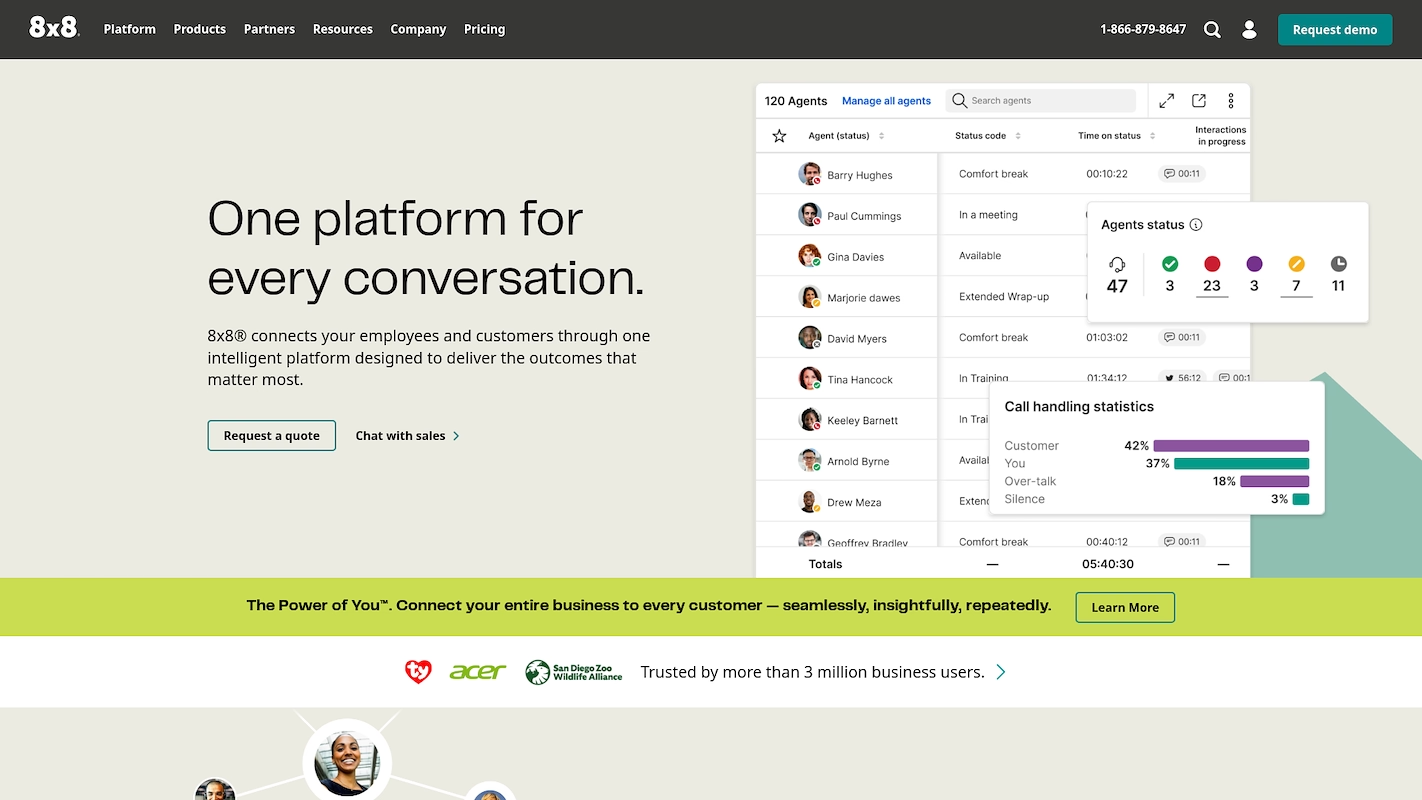
The 8x8 X Series is a cloud communications platform that unifies contact-center, voice, video, and chat. It provides global calling and can add enterprise telephony to Microsoft Teams. The platform is designed to consolidate multiple communication tools into one.
It helps modernize older PBX systems and offers a single application for voice, video meetings, and team collaboration to connect employees and customers.
8x8 X Series's Main Features
- Offers unified communications through 8x8 Work, which combines global calling, video meetings, and team chat into one application.
- Provides an omni-channel contact center with built-in AI to simplify operations and manage customer interactions.
- Includes no-code and low-code APIs to embed communication channels such as voice, SMS, and chat into any application.
- Adds enterprise telephony and contact center functions natively inside the Microsoft Teams platform.
How 8x8 X Series Compares To Vonage
Average Review score: 4.2/5 stars based on 765 G2 reviews.
- 8x8 X Series offers global calling in over 55 countries with a 99.999% uptime service level agreement, providing a more defined reliability guarantee than Vonage's standard plans.
- The platform supports large video meetings for up to 500 participants and can live stream to YouTube, a different scale compared to Vonage's video functions.
- It includes speech analytics and coaching tools that analyze interactions for performance insights, offering deeper analysis than the standard call reporting in Vonage.
- This tool connects with over 40 enterprise applications like Salesforce and Microsoft Teams, providing more prebuilt integration options than are typically available with Vonage.
Where 8x8 X Series Falls Short
- Some users find the platform's interface difficult to navigate due to its extensive features. In comparison, Vonage offers a more straightforward user experience focused primarily on VoIP services.
- The all-in-one nature of the 8x8 X Series can result in a higher cost. Teams that only need basic phone service may find Vonage to be a more budget-friendly option.
- According to some reviews, getting technical support can sometimes be a slow process. This may be a consideration for businesses that need quick resolutions, as Vonage's support is tailored to a smaller set of features.
Pricing and Budget Considerations
According to G2 data, both 8x8 X Series and Vonage have a high perceived cost. However, 8x8 may offer a faster return on investment at 15 months compared to Vonage's 17 months. For the most accurate pricing information, we recommend visiting the 8x8 X Series's official website.
3) Twilio Communications Platform
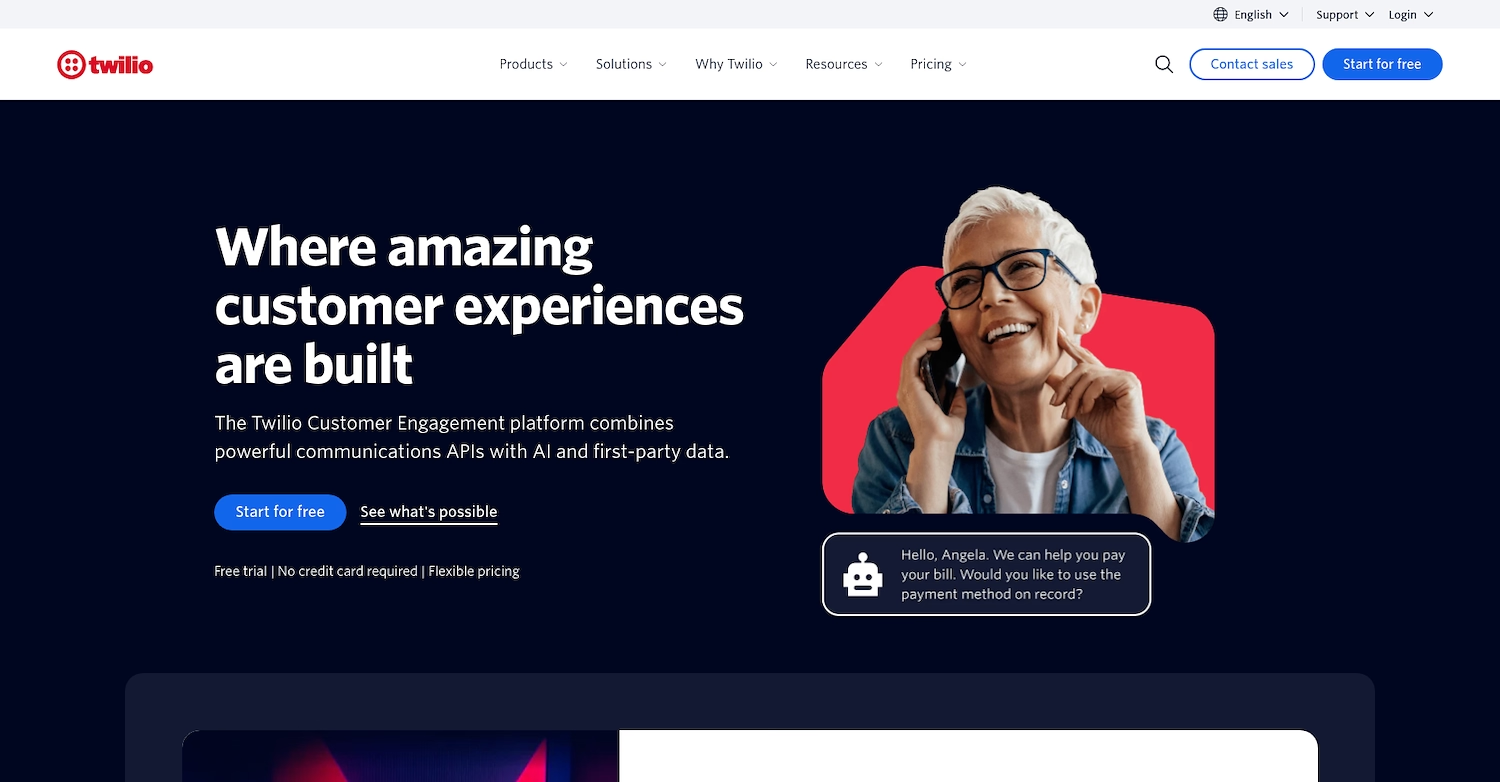
The Twilio Communications Platform is a cloud service that offers APIs for developers to create custom communication tools. It combines voice, SMS, and email channels with customer data to support personalized experiences.
Its functions support outbound sales calls, systems to track calls, and AI-enabled IVR. The platform uses a pay-as-you-go model and offers a free trial to start.
Twilio Communications Platform's Main Features
- Unifies customer profiles and enables real-time data collection with its Customer Data Platform (Segment).
- Provides serverless tools like Twilio Functions and a visual builder called Studio for rapid application development.
- Offers authentication and identity services, including two-factor authentication, one-time passwords, and phone number intelligence.
- Includes the SendGrid Email API for high-volume email delivery with features like templating and analytics.
How Twilio Compares To Vonage
Average Review score: 4.2/5 stars based on 482 G2 reviews.
- Twilio provides a cloud API for developers to build custom communication tools. This developer-first approach differs from Vonage's pre-built platform and allows for greater customization.
- It operates on a pay-as-you-go pricing model. This offers more flexibility for businesses with fluctuating usage compared to Vonage's typical subscription plans.
- The platform includes a Customer Data Platform (Segment) to unify customer data. This enables more personalized interactions than the standard communication features available with Vonage.
- This tool integrates the SendGrid Email API for high-volume email delivery. This adds a dedicated email channel, which is a different focus from Vonage's primary voice services.
Where Twilio Communications Platform Falls Short
- Twilio's platform is designed for developers, so it requires technical skills to set up and manage. In comparison, Vonage provides a pre-built application that non-technical users can operate immediately.
- Some users report that getting timely customer support can be difficult. This might be a consideration for businesses that need immediate help, as Vonage offers a more structured support model for its services.
- The tool does not include many ready-made features out of the box. Unlike Vonage, which provides a complete phone system, users must build functionalities like call queues or a softphone client themselves using Twilio's APIs.
Pricing and Budget Considerations
G2 data indicates Twilio may offer a faster return on investment at 13 months compared to Vonage's 17 months. While Twilio uses a flexible pay-as-you-go model, Vonage offers subscription plans with more predictable costs. For detailed pricing, visit the Twilio Communications Platform's official website.
4) Zoom Phone
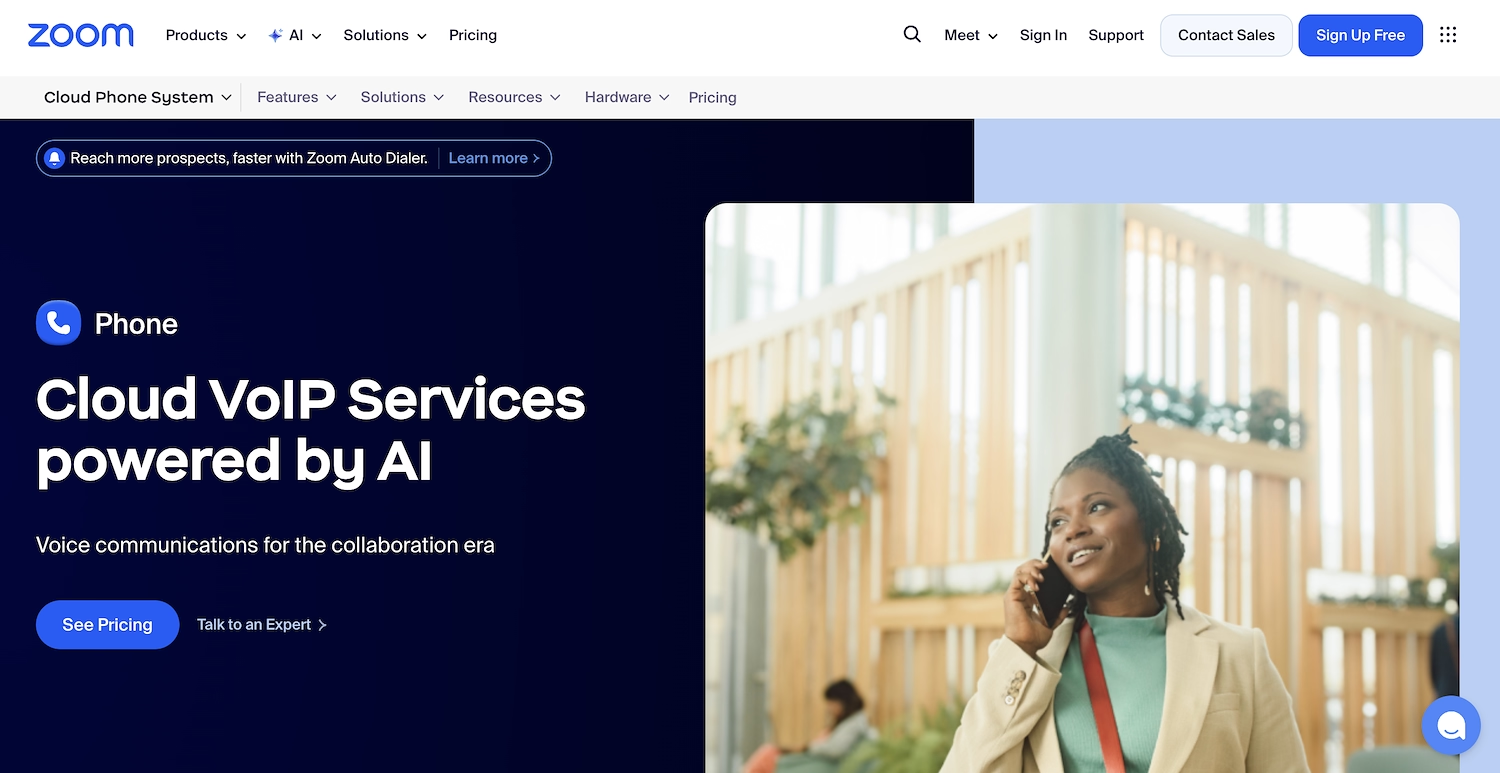
Zoom Phone is a cloud phone system inside the Zoom platform. It unifies voice, video, and chat into one application. The service directs calls, provides auto attendants, and can record calls.
It can replace legacy PBX hardware and supports hybrid work. One business number functions on both desktop and mobile. The system offers a global presence for international teams and acts as a phone dialer.
Zoom Phone's Main Features
- It unifies voice, video, and chat into a single application.
- The system provides call management features, including auto attendants and call recording.
- A single business number functions on both desktop and mobile devices to support hybrid work.
How Zoom Phone Compares To Vonage
Average Review score: 4.6/5 stars based on 2,481 G2 reviews.
- Zoom Phone includes an AI Companion that creates post-call summaries and extracts tasks from voicemails. This provides a different level of automation compared to Vonage's standard call management features.
- It integrates phone, chat, and meetings into a single application. This unified approach differs from Vonage, which primarily focuses on providing separate voice communication services.
- The tool offers native service in over 40 countries and allows users to bring their own carrier. This provides more global flexibility than Vonage's typical regional plans.
- Zoom Phone's PowerPack can generate a concise summary of Team SMS threads. This feature for text communication offers a different capability than the standard SMS functions available with Vonage.
Where Zoom Phone Falls Short
- Zoom Phone integrates many tools, which can feel complex for users who only need basic phone service. In comparison, Vonage provides a more focused and simpler user experience centered on VoIP.
- Some users find that certain advanced telephony features are less developed compared to dedicated providers. Businesses that need highly specific call routing functions might find Vonage's specialized platform offers more depth.
- While generally reliable, some reviews mention occasional call quality issues like lag or drops. Teams that require consistent voice connections for all calls may find Vonage's dedicated infrastructure more stable.
Pricing and Budget Considerations
Zoom Phone’s plans start at $15.00 per license per month, offering a clear entry point for businesses. Vonage does not list specific prices, but its subscription model contrasts with Zoom's tiered plans, so direct quotes are necessary for a true cost analysis. For more details, visit Zoom Phone's official website.
5) Dialpad AI Voice
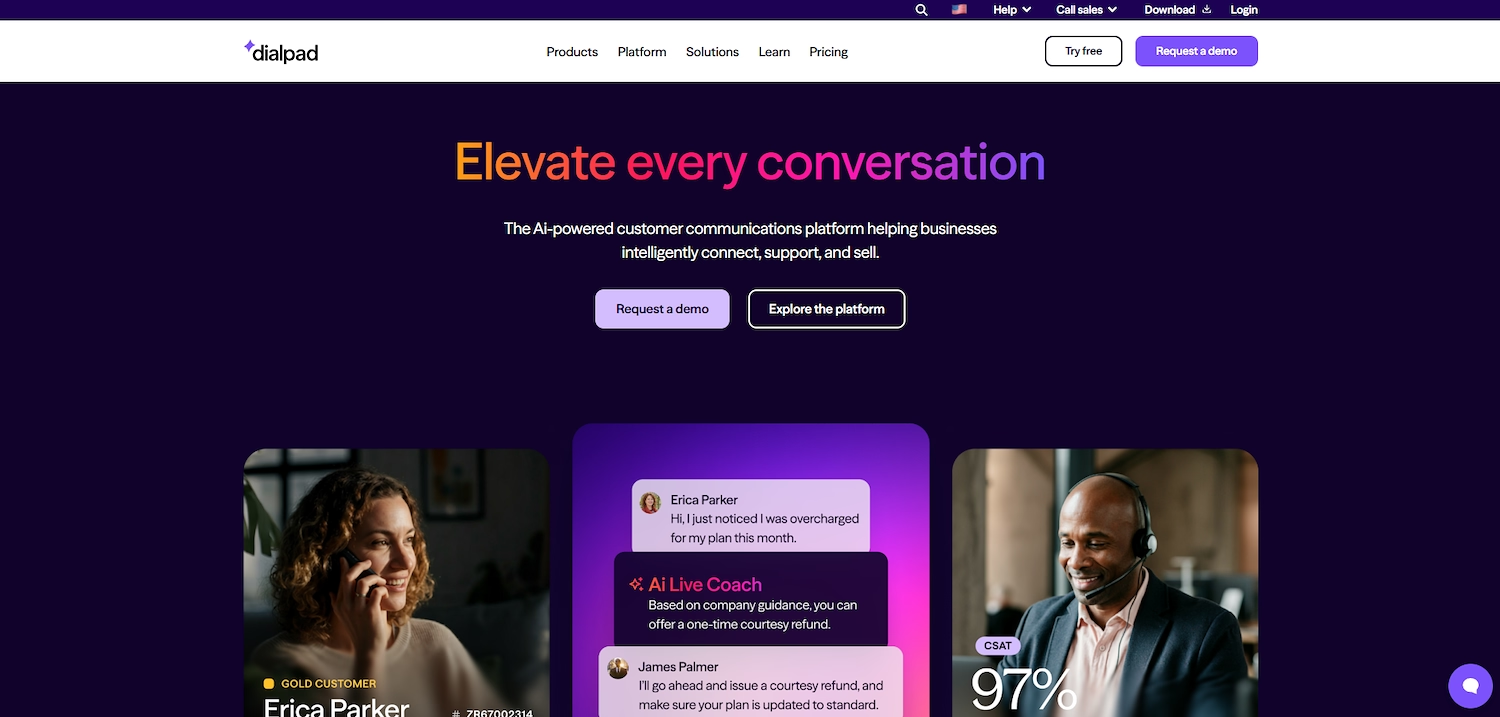
Dialpad AI Voice is a business phone system that uses artificial intelligence. The platform unifies voice, messages, and meetings into a single application. It provides real-time transcription and analysis of conversations.
The system can act as a phone dialer for sales teams or serve as a company's main phone line. It is built to support various work models, including remote and hybrid offices.
Dialpad AI Voice's Main Features
- Provides automation, conversation intelligence, sentiment analysis, live coaching, and post-call recaps through its core AI engine.
- Offers a cloud contact center with AI agents, live assistance, coaching, analytics, and CSAT scoring.
- Includes an outbound sales dialer with real-time AI coaching, insights, and power-dialing capabilities.
How Dialpad AI Voice Compares To Vonage
Average Review score: 4.4/5 stars based on 3,901 G2 reviews.
- Dialpad AI Voice provides real-time call transcription and automated summaries through its AI engine. This offers deeper conversational insights than the standard call management features in Vonage.
- It combines voice, messaging, and video meetings within one application. This unified approach is different from Vonage, which primarily focuses on voice communication services.
- The platform's AI features use a proprietary large language model trained on billions of minutes of conversation. This provides a different level of analysis compared to the basic call reporting available with Vonage.
- This tool lets users switch active calls between devices without interruption. This feature provides flexibility for mobile teams, which is a different experience than Vonage's standard device handling.
Where Dialpad AI Voice Falls Short
- Some administrators may find Dialpad's many AI features create a learning curve. Compared to this, Vonage offers a more straightforward platform focused on core VoIP services, which can be simpler for some teams to manage.
- Some users report occasional connection glitches or microphone issues during calls. While no service is perfect, Vonage is often noted for its general reliability as a dedicated VoIP provider.
- The tool's pricing plans may include added fees for services like SMS. This is different from Vonage's subscription model, which typically bundles features into a more predictable monthly cost.
- Users sometimes note sporadic limitations with features like call transfers. Businesses that depend heavily on these specific functions might find Vonage's dedicated platform offers more consistent performance for core call management.
Pricing and Budget Considerations
Dialpad AI Voice plans start at $15 per user per month with annual billing, offering a transparent entry point. In contrast, Vonage requires a custom quote for its subscription plans, making Dialpad's costs more predictable for initial budgeting.
Our Recommendation For Sales Teams
While the tools above focus on unified communications, your needs might be specific to sales automation. If you want to add digital workers to your sales process, explore what 11x offers for prospecting, outreach, and lead qualification.
With 11x, AI agents run the sales process. Alice finds accounts, enriches data, and performs outreach, while Julian handles calls, qualifies prospects, and schedules meetings. The platform unifies tools for intent data and email warmup, replacing the need for multiple separate solutions.
Book a demo to see it in action.
6) Nextiva
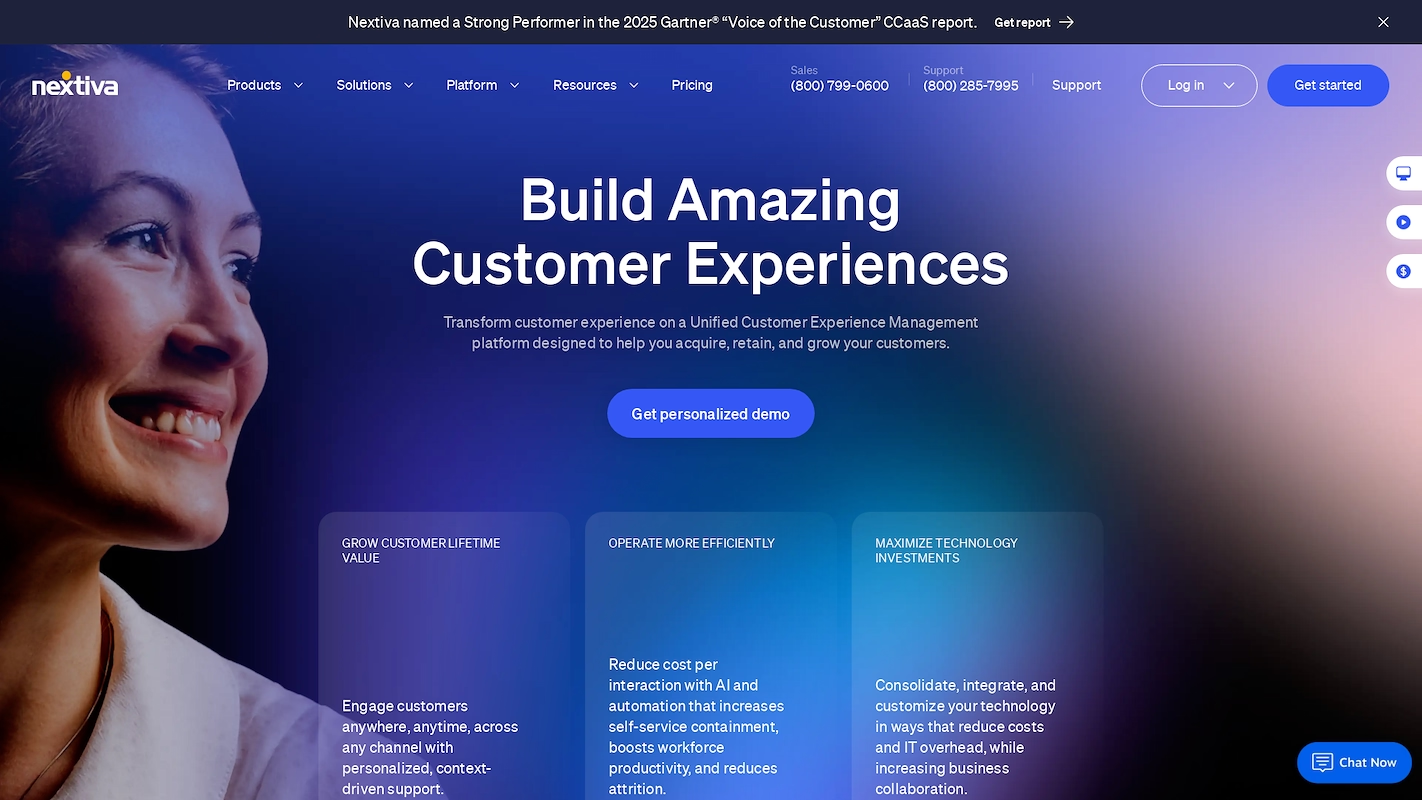
Nextiva is a cloud communication platform that unifies business phone, video, collaboration, and customer management tools into a single workspace. It provides a suite of tools like VoIP phone service, team messages, and video meetings that work together.
The platform functions as a business phone system with an auto-attendant, call direction, and voicemail-to-email. Businesses also use it as a contact center solution for sales and support calls.
Nextiva's Main Features
- Consolidates customer touch-points like voice, chat, SMS, and social media into a single workspace.
- Orchestrates customer journeys with a patented workflow engine and offers AI-powered self-service through virtual assistants.
- Provides a generative-AI knowledge base, sentiment analysis, and real-time language detection and translation.
- Includes an AI-powered contact center with skills-based routing and a secure payment agent to process transactions during live interactions.
How Nextiva Compares To Vonage
Average Review score: 4.5/5 stars based on 3,333 G2 reviews.
- Nextiva provides AI-powered tools like sentiment analysis and virtual assistants for customer experience. This is a different approach compared to Vonage's focus on traditional voice communication.
- It consolidates various customer channels, including social media and SMS, into a single view. This differs from Vonage, which centers its services mainly around business phone systems.
- The platform includes a workflow engine to automate customer journeys across different touchpoints. This offers a level of process orchestration not typically found in Vonage's standard offerings.
- This tool offers a secure payment agent that processes transactions during live interactions. This is a specific feature for sales and support teams that is distinct from Vonage's core communication tools.
Where Nextiva Falls Short Compared To Vonage
- Nextiva's platform has many features, which some users find complex to navigate. In comparison, Vonage offers a more direct user experience that may be simpler for teams that do not need extensive customization.
- Some users report occasional service instability or connection problems with the platform. This might be a consideration for businesses that prioritize consistent call quality, an area where Vonage's focused VoIP service is often noted for its reliability.
- The tool's contract terms can be a concern for some, with reviews mentioning issues like unexpected auto-renewals. Businesses that prefer a simple subscription model may find this different from Vonage's more predictable billing structure.
Pricing and Budget Considerations
Nextiva provides transparent pricing with plans starting at $20 per user per month, offering clear budget expectations. In contrast, Vonage does not publish its pricing and uses a custom quote model, requiring direct contact for cost details. This makes Nextiva's costs more predictable for initial planning, though a direct quote from both is needed for a true comparison.
7) GoTo Connect
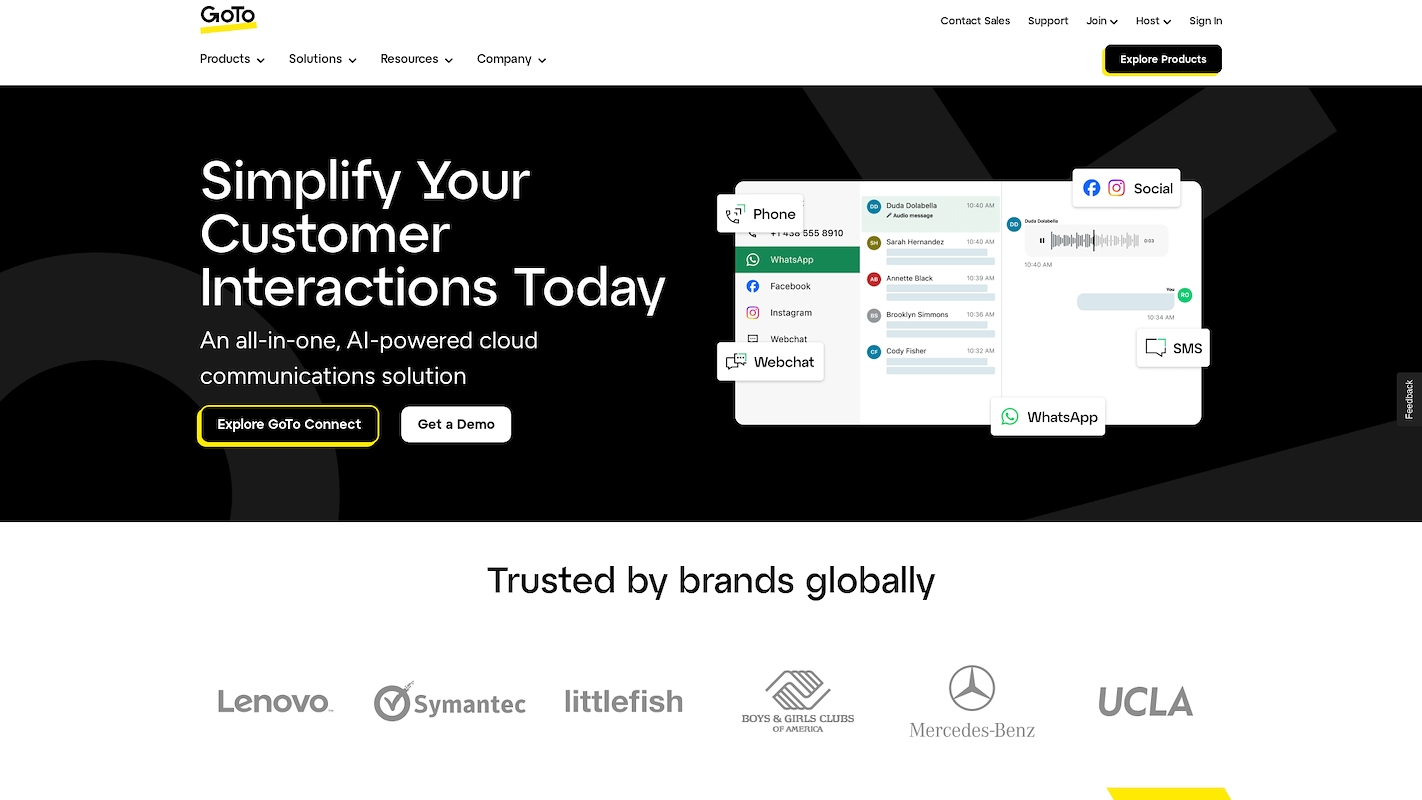
GoTo Connect is a cloud communication system that integrates phone, meeting, and messaging services into one application. The platform provides a unified solution for business communications, including phone dialer functions.
It supports companies that require a single tool for internal collaboration and external customer contact. The system is designed to work across various devices to accommodate different work environments.
GoTo Connect's Main Features
- It includes a visual dial-plan editor for creating call flows with a drag-and-drop interface.
- The system provides an AI Receptionist that answers calls and automates tasks, plus AI-generated call summaries and sentiment analysis.
- It offers an omnichannel customer experience suite to manage digital channels like SMS, web-chat, email, and social media.
- The platform features an AI-powered contact center with quality-management tools for supervisors and integrations for voice, email, and chat.
How GoTo Connect Compares To Vonage
Average Review score: 4.4/5 stars based on 1,339 G2 reviews.
- GoTo Connect includes a visual dial-plan editor to create call flows with a drag-and-drop interface. This provides a different way to manage call routing compared to Vonage's more traditional setup.
- It uses an AI Receptionist to automate call answering and routing, offering a different level of automation than the standard auto-attendant features available with Vonage.
- The platform offers an omnichannel suite to manage digital channels like SMS and social media. This is a different focus from Vonage, which primarily centers on voice communication.
- This tool provides a 99.999% uptime service level agreement. This offers a more specific reliability guarantee than what is typically found in Vonage's standard plans.
Where GoTo Connect Falls Short Compared To Vonage
- GoTo Connect includes many features, which can make the platform feel complex for some teams. In comparison, Vonage provides a more focused user experience centered on core VoIP services.
- Some users report that its customer support can be slow to resolve issues. This is different from Vonage, where the support team handles a more specialized and smaller set of features.
- The tool sometimes has call quality problems like lag or dropped calls, according to reviews. Businesses that require consistent voice connections may find Vonage's dedicated infrastructure more stable.
Pricing and Budget Considerations
GoTo Connect offers transparent pricing with plans starting at $27 per user per month. In contrast, Vonage uses a custom quote model, so you must contact them directly for pricing details. This makes GoTo Connect's costs more predictable for initial planning, but a direct quote from both is necessary for a true cost comparison.
8) Genesys Cloud CX
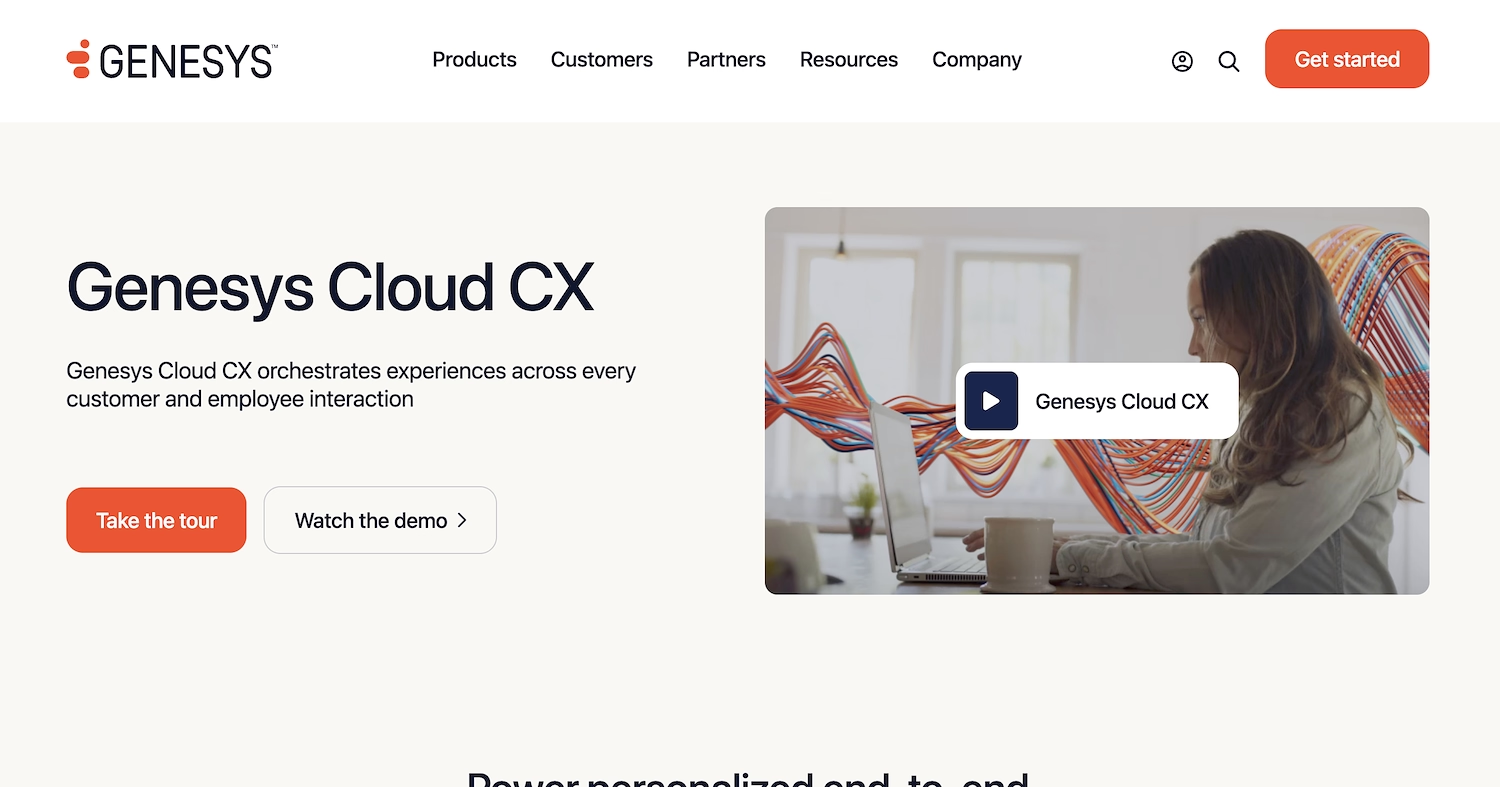
Genesys Cloud CX is a cloud platform built for customer experience. It offers communication tools for businesses to manage customer interactions across various touchpoints. The system provides capabilities for contact centers, including phone dialer functions for sales and support teams.
The platform works to unify these interactions into a single solution. This provides a complete view of the customer journey.
Genesys Cloud CX's Main Features
- Offers communication channels including voice, web chat, and email.
- Includes functions for session routing, session queuing, and concurrent calling.
- Provides administrative tools such as session summary notes and administrator access.
- Features reporting and dashboards for performance tracking.
How Genesys Cloud CX Compares To Vonage
Average Review score: 4.4/5 stars based on 1,432 G2 reviews.
- Genesys Cloud CX unifies digital channels like social media, chat, and email into one platform. This provides a different experience compared to Vonage, which focuses mainly on voice communication services.
- It uses smart automation to manage the customer journey across different channels. This offers more advanced workflow capabilities than the standard call management features in Vonage.
- The platform provides AI tools, such as Co-Pilot, for real-time agent guidance during customer interactions. This level of agent support is a different feature set from what Vonage offers.
- This tool includes advanced session routing that directs interactions from multiple channels, not just calls. This is a more complex system than Vonage's traditional phone call routing.
Where Genesys Cloud CX Falls Short
- Some users report that the platform lacks certain specific telephony features. This is different from Vonage, which focuses its service on providing a deep set of core voice functionalities.
- Genesys Cloud CX's reporting tools can be limited out of the box. Teams might need to put in extra effort for custom reports, unlike the more straightforward reporting available in Vonage for its services.
- The system's complexity can be a challenge for businesses that only need a simple phone service. In comparison, Vonage provides a more direct user experience centered on core VoIP features.
Pricing and Budget Considerations
G2 data indicates a high perceived cost for both platforms. Genesys Cloud CX may have a longer return on investment at 19 months compared to Vonage's 17 months. For the most accurate pricing, we recommend visiting the Genesys Cloud CX's official website.
9) Aircall
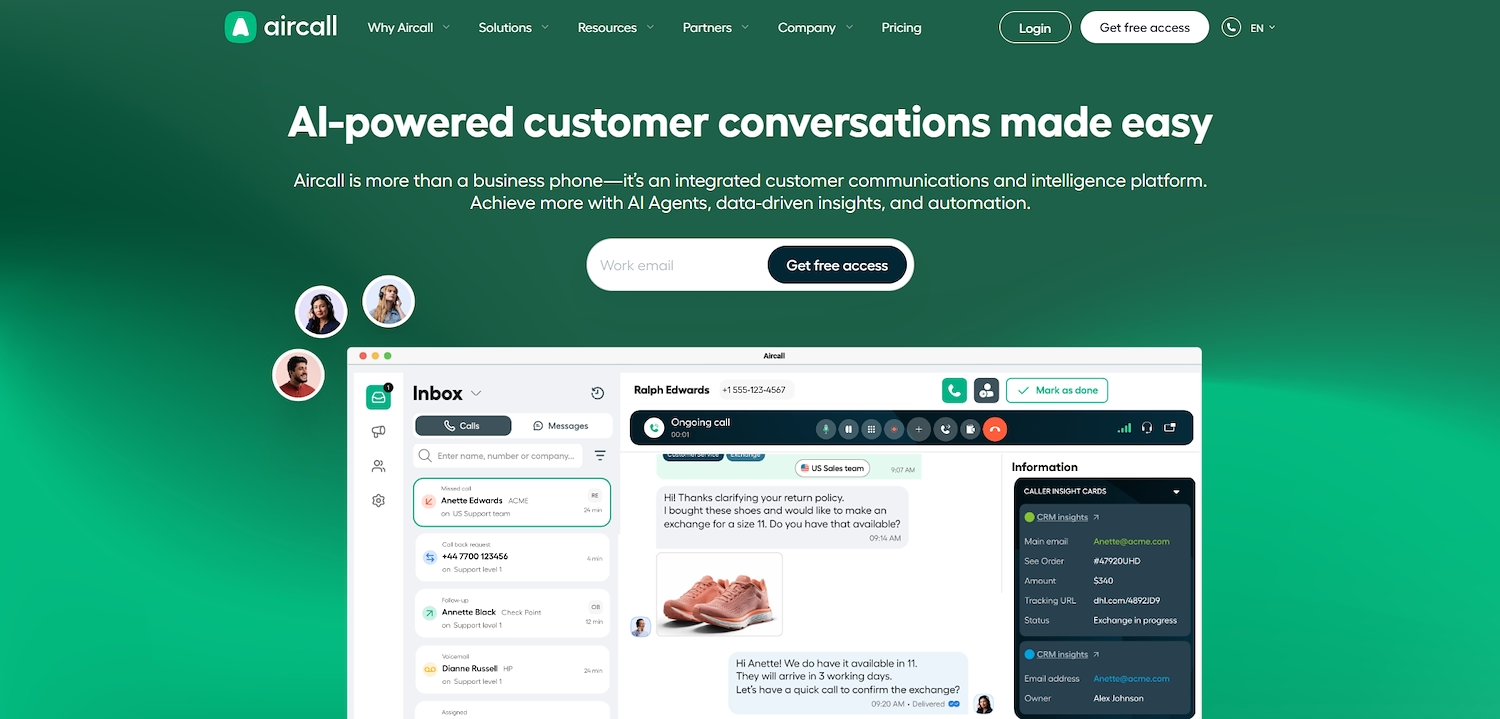
Aircall is a cloud phone system built for sales and support teams. It operates as a phone dialer inside a company's existing software stack through integrations. The platform provides voice communication tools for customer-facing roles.
The system is a solution for businesses that need to equip their teams with phone capabilities for outreach and service calls without extra hardware.
Aircall's Main Features
- Integrates with over 100 business applications and offers bi-directional data syncing with CRMs and helpdesks.
- Includes call center features such as a power dialer, an analytics dashboard, and live call coaching.
- Uses AI to optimize call routing, automate tasks, and deliver insights from customer interactions.
- Unifies voice, SMS, WhatsApp, and social media channels into a single communication platform.
How Aircall Compares To Vonage
Average Review score: 4.4/5 stars based on 1,314 G2 reviews.
- Aircall integrates with over 100 business applications, including CRMs and helpdesks. This provides more extensive connectivity options compared to the standard integrations available with Vonage.
- The platform uses AI to deliver insights from customer calls and automate tasks. This offers a different level of analysis than the basic call reporting found in Vonage.
- It includes specific tools for sales teams, such as a power dialer and live call coaching. These features provide more direct sales support than Vonage's general communication tools.
- This tool unifies communication channels like SMS and social media into a single platform. This is different from Vonage, which centers its services mainly on voice communication.
Where Aircall Falls Short Compared To Vonage
- Some users report that Aircall can have connection problems on a weak internet connection. Vonage, by comparison, is often noted for its focus on reliable call stability.
- The tool is highly specialized for sales and support teams with many specific features. In comparison, Vonage provides a more general-purpose phone system that can be simpler for businesses without those specific needs.
- Aircall's pricing plans sometimes have usage limits for services like SMS, which can result in extra fees. This contrasts with Vonage's model, which typically offers more predictable costs within its subscription plans.
Pricing and Budget Considerations
Aircall provides transparent pricing with plans starting at $30 per user per month, billed annually with a three-user minimum. In contrast, Vonage uses a custom quote model and does not publish its pricing. This makes Aircall's costs more predictable for initial budgeting, though a direct quote from both is necessary for a true cost comparison.
10) CloudTalk
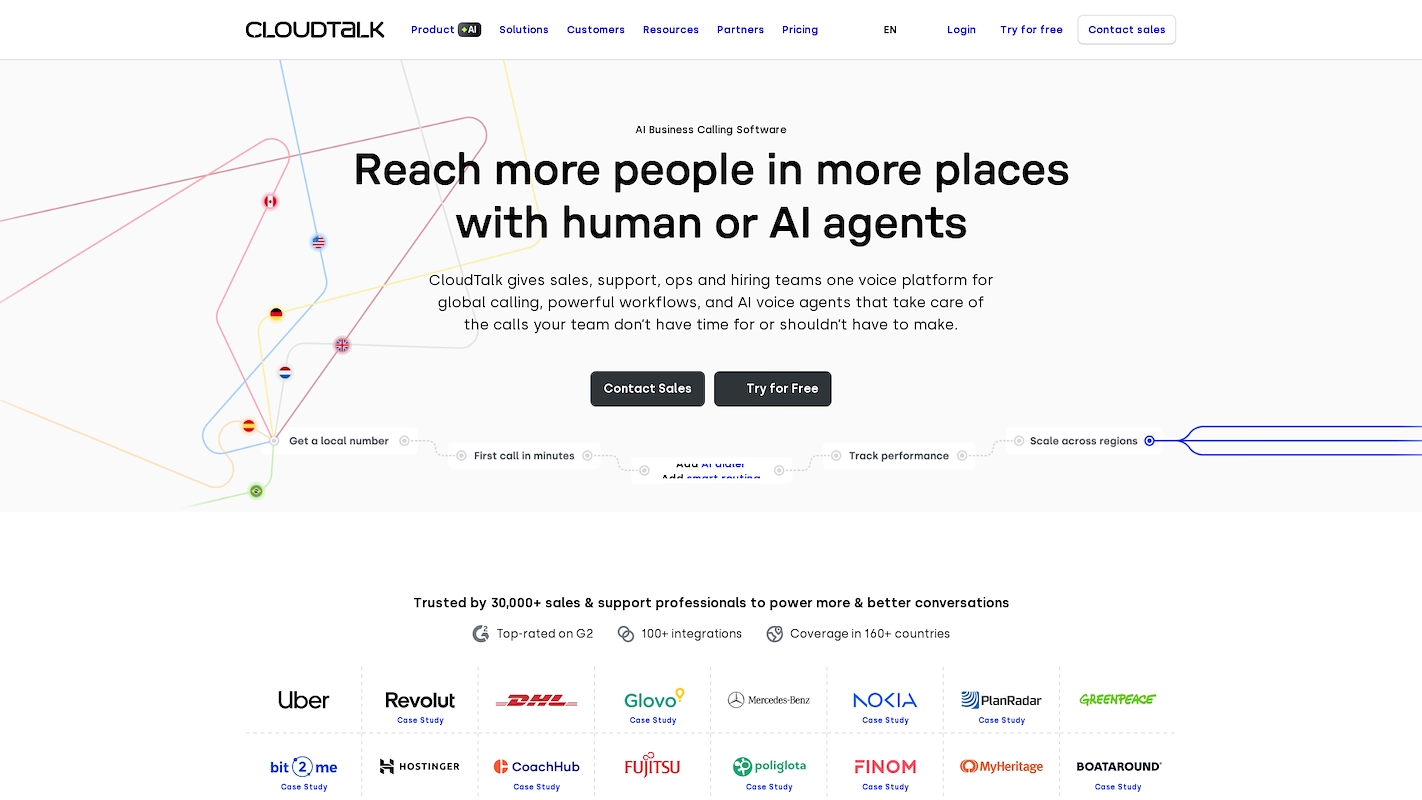
CloudTalk is a cloud-based phone system for sales and customer service teams. The platform operates as a virtual call center and provides phone dialer capabilities for outbound campaigns. It helps businesses manage their call operations and supports teams that work from different locations.
The system integrates with various CRM and helpdesk tools to keep data in one place.
CloudTalk's Main Features
- Includes session routing, session queuing, and concurrent calling.
- Provides voice and mobile SMS as communication channels.
- Offers call recording and session summary notes for review.
- Features reporting and dashboards for performance tracking.
How CloudTalk Compares To Vonage
Average Review score: 4.4/5 stars based on 1,384 G2 reviews.
- CloudTalk provides AI-powered coaching and call transcripts. This offers more detailed post-call analysis compared to Vonage's standard call reporting features.
- It includes smart dialing functions designed for sales teams. This provides more specialized outbound call capabilities than the general phone dialer in Vonage.
- The platform features a drag-and-drop workflow builder to automate call processes. This offers more customization for call flows than the typical call routing setup in Vonage.
- This tool supports calling in over 160 countries, which provides broader international reach than the regional plans typically offered by Vonage.
Where CloudTalk Falls Short
- Some users report occasional call quality issues with CloudTalk, such as dropped calls. In comparison, Vonage is often noted for its reliable performance as a dedicated VoIP service, which may provide more consistent connections.
- The platform's focus on sales and support teams means it has many specialized features. This can be complex for businesses that only need a basic phone system, unlike Vonage, which offers a more general-purpose and straightforward user experience.
- CloudTalk's service centers primarily on voice and SMS channels. Compared to Vonage, it may lack a fully integrated suite for video conferencing or internal team messaging, which some businesses might require for a complete communication solution.
Pricing and Budget Considerations
CloudTalk provides transparent pricing with plans starting at $19.00 per user per year. In contrast, Vonage does not publish its pricing and relies on a custom quote model. This makes CloudTalk's costs more predictable for initial budgeting, though a direct quote from both is necessary for a true comparison.
Which One Should You Go With?
Choosing a Vonage alternative depends on many variables, from your team's specific needs to your budget. This guide has outlined several options to help you make an informed decision.
If your focus is on sales automation, 11x offers a different approach with its AI agents. These digital workers handle tasks like prospecting, outreach, and lead qualification, which can complement your sales team's efforts and replace multiple point solutions.




